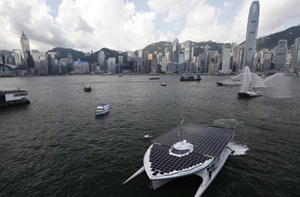Transport links vital to Beibu growth
Updated: 2011-08-19 10:52
By Li Jiabao and Huang Zhaohua (China Daily)
|
|||||||||||
NANNING - Transportation will be a key factor in further boosting the development of the Pan-Beibu Gulf (PBG) economic zone in South China, officials said during a forum on Thursday.
"Transportation infrastructure will take the lead in further promoting the development of the Pan-Beibu Gulf economic zone," Yb Tuan Jelaing Anak Mersat, deputy minister of transport of Malaysia, said during the Pan-Beibu Gulf Economic Cooperation Forum.
Win Shein, deputy minister of transport of Myanmar, said that he is "confident that transportation will be the priority" in the PBG's economic development."
The two-day forum, which began on Thursday in Nanning, the capital of the Guangxi Zhuang autonomous region, is intended to serve as a platform for discussion among government officials and experts from the seven countries of the PBG economic zone, including China, Vietnam and the Philippines.
Mersat said that transport facilities in the zone aren't yet sufficient to support the region's fast-expanding trade.
Jiang Yaoping, China's vice-minister of commerce, said that regional connectivity, supported by transportation infrastructure, is a practical requirement for the development of the zone and free trade.
"The building of PBG economic cooperation requires a more convenient, efficient and integrated network of transportation. The Ministry of Commerce will jointly set up an exclusive committee with other authorities to boost the development of key fields including infrastructure, ports and logistics."
Zhang Dawei, vice-director of the planning department of China's Ministry of Railways, said that the ministry would give policy preference to the PBG's economic development.
"The ministry will give policy preference in transportation services to PBG economic cooperation. The optimization of current railway transportation resources will ensure steady increases of railway transportation volume, especially in the key fields of coal, oil and minerals."
At the end of 2010, the PBG zone had 3,200 km of rail lines. The network is projected to expand to 5,000 km by 2015.
Wang Yongmin, vice-president of China Development Bank Corp, said that the bank has sent committees to PBG countries to establish long-term financing platforms covering infrastructure, resources and industries.
However, Jin Baisong, deputy director of the department of Chinese Trade and Studies at the Chinese Academy of International Trade and Economic Cooperation, which is affiliated with the Ministry of Commerce, expressed concern that policy and regulatory differences among countries would affect the efficiency of transport networks.
"Goods cannot travel very freely from one country to another without complex customs procedures. The PBG countries need to integrate deeply to eliminate trade barriers."
The PBG economic cooperation zone, a sub-network of the China-ASEAN (Association of Southeast Asian Nations) free-trade zone started in 2006, has played an important role in reducing the negative influence of the global economic recession and boosting regional economic development, Jiang said.
Related Stories
China to inject 2.6t yuan for Beibu Gulf economic zone's growth 2011-03-14 09:17
Pan-Beibu Gulf members ink port agreements 2010-08-13 14:51
- Experts urge China to trim US T-bond holdings
- Coke to invest $4b in China
- Mining limits drive rare-earth investors abroad
- Small firms not in large scale bankruptcies
- Desalination program to be worth its salt
- China Mobile Q2 profit up 7%
- China to review commercial prepaid cards
- Sina to monetize Weibo Web service













